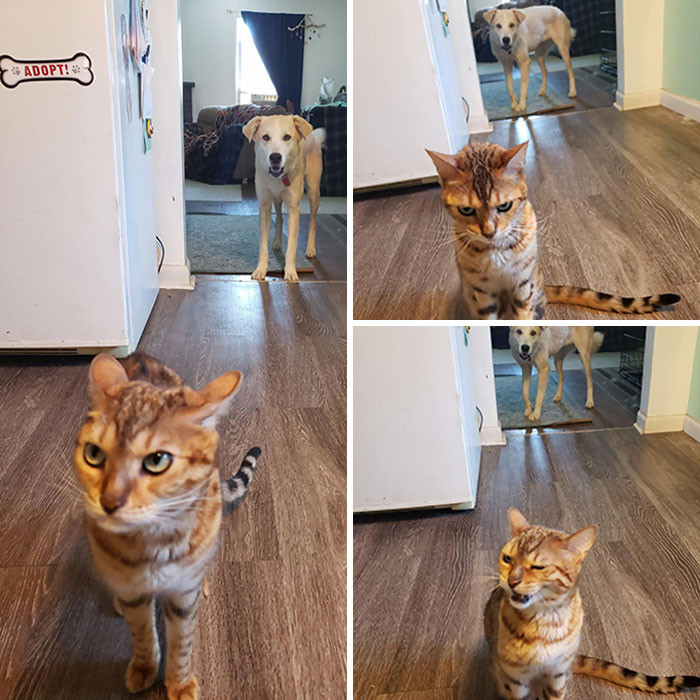Hilarious Pictures Of Animals Who Didn't Know How To React After Having A Terrible Day
There's no worse feeling than realizing that your whole day is going to continue being crappy. Bad things keep happening one after the other and it always feels that there's nothing you could do to stop it, you just have to wait for the day to be over and try again tomorrow.
Even though their world is much simpler than ours, animals can also have bad days from time to time. And whenever they do, their reactions are always more hilarious than the situation itself, they never know how to deal with it and they start doing so many random things.
"Sarah (Dog) Stole A Bite Of Stella's Food And Stella Came Running To Me In The Kitchen To Complain About It"

"I Had To Cut Down A Tree In My Yard And Now I Feel Bad"

"My Pitbull Always Thought He Was The Biggest Dog At The Dog Park"

Animals, much like humans, exhibit emotional responses to their environments. A study published in Behavioral Processes highlights that animals show signs of stress or anxiety, akin to humans facing bad days.
This suggests that animals possess emotional depth, reacting humorously to mishaps as a coping strategy. Observing these behaviors can provide insight into their emotional landscapes, helping owners create environments that support their mental well-being.
Understanding Animal Behavior
Dr. Angela Martinez, an animal behaviorist, explains that animals, much like humans, can experience a range of emotions.
When animals encounter stressful situations, their reactions can mirror those of humans facing similar challenges.
This suggests that animals have their own coping mechanisms and emotional responses to adversity.
Understanding Animal Behavior
Dr. Laura Martinez, an animal behaviorist, highlights that animals, like humans, experience emotions and stress.
Research indicates that animals can exhibit signs of distress or confusion, similar to how humans react to challenging situations.
Understanding these emotional responses can enhance our empathy towards animals and their experiences.
"My Dog Ran Away, After Hours Of Looking I Came Home To This"

"I Think A Squirrel Fell Off My Roof"

"A Memorial For The Squirrel That Ate Through A Wire That Canceled Classes For Two Days. It Was Paid For By The Undergrad Class"

Humor as a Coping Mechanism
Humor serves as a vital coping strategy for both humans and animals. Research shows that laughter can reduce stress and improve mood, acting as a buffer against life's challenges.
According to a study by Dr. Robert Provine, laughter releases endorphins, promoting social bonding and alleviating tension. This principle applies to animals, whose playful antics remind us that finding humor in adversity can lighten our burdens and foster resilience.
Furthermore, the expressions of confusion or distress in animals can be indicative of their emotional states.
Research shows that animals exhibit behavioral changes when faced with unfamiliar or stressful circumstances.
This aligns with the concept of emotional contagion, where feelings can be shared across species.
When animals face difficult situations, their behavior can often reflect a range of emotions, including frustration or anxiety.
Studies show that providing a supportive environment for animals can help mitigate these negative experiences.
For instance, creating safe spaces for pets can reduce their stress levels and improve their overall well-being.
He wanted to be with his favorite hooman

"My Buddy's Dog Saw A Moose"

"I Think My Dog Just Died A Little Bit On The Inside When I Didn't Give Her The Last Bite Of My Burger"

Dr. Angela Duckworth, a psychologist at the University of Pennsylvania, emphasizes the importance of grit in overcoming challenges. Her research reveals that perseverance can significantly impact success rates in both humans and animals.
When animals face difficulties, their reactions often reflect an instinctual determination to adapt. Understanding this can help pet owners reinforce resilience in their animals, ensuring they develop healthy coping mechanisms during tough times.
The Human-Animal Connection
The bond between humans and animals is a powerful aspect of emotional well-being.
Dr. Linda Harrison from the University of Minnesota emphasizes that animals often provide companionship and emotional support, which can be crucial for mental health.
Interactions with animals can reduce stress and promote feelings of happiness and comfort.
The Role of Positive Reinforcement
Positive reinforcement is an effective strategy for shaping animal behavior.
Research shows that rewarding desired behaviors can lead to more consistent and positive outcomes in training.
Using treats or praise can build trust and strengthen the bond between animals and their caregivers.
"Do You Think This Is Funny?"

"So This Happened (Yes, I Rescued It)"

"We Actually Had To Help Him Down. Idiot"

The Role of Social Support
Social support is crucial during difficult times, whether for humans or animals. Research indicates that strong social bonds can buffer stress and lead to better overall health.
In a study by Dr. Julianne Holt-Lunstad, it was found that perceived social support enhances resilience. Providing companionship and affection to pets can thus support their emotional recovery, promoting a happier and healthier life.
Moreover, observing animals navigating their own challenges can provide insights into resilience.
Research indicates that watching animals cope with adversity can inspire humans to adopt similar coping strategies.
This highlights the therapeutic potential of animal interactions in enhancing emotional well-being.
Moreover, understanding the importance of routine can significantly impact an animal's behavior.
Studies indicate that animals thrive on predictability and routine, which can help reduce anxiety and promote a sense of security.
Establishing consistent schedules for feeding, exercise, and play can enhance their overall quality of life.
"Our Dog Opened The Upstairs Screen Door And Followed Our Cat Onto The Roof. He Required Consoling Before Coming Back Inside"

"My Friends' Cat Got Its Head Stuck In A Vase, Freaked Out, Broke The Vase, And Was Left With This"

"A Little Hamster With A Broken Bone, The Doctor Had A Hard Time Dressing It"

Cognitive Behavioral Therapy (CBT) principles can apply to animal behavior as well. Just like humans, animals learn through experiences, and their reactions can be shaped by positive reinforcement.
Research by Dr. B.F. Skinner demonstrated that positive outcomes encourage desirable behavior. Pet owners can utilize this principle to help their animals navigate frustrating situations by rewarding calm responses, ultimately enhancing their emotional resilience.
The Role of Humor in Animal Behavior
Humor often emerges in our interactions with animals, providing a necessary light-hearted approach to life's challenges.
Dr. Samuel Lee, a psychologist specializing in humor, notes that laughter can act as a buffer against stress.
In the context of animals, humorous situations can remind us not to take life too seriously.
The Impact of Socialization
Socialization plays a crucial role in an animal's development and behavior.
Research highlights that animals that are well-socialized are generally more adaptable and less fearful in new situations.
Early exposure to various environments and people can foster well-rounded behavior in pets, making them more comfortable in different settings.
"A Friend Left Her Dog At Home And Came Back To This. Oreo Apparently Found A Bag Of Charcoal And Played With It"

"Just A Cat Falling Off A Table"

"This Fat Fool Had To Be Rescued By Animal Control"

Understanding Animal Emotions
Research in animal psychology sheds light on the emotional lives of pets. A study published in Frontiers in Psychology indicates that dogs can experience a variety of emotions, from joy to frustration.
Recognizing these emotions helps pet owners respond appropriately to their animals' needs, ensuring better behavioral outcomes. This awareness fosters a supportive environment, which is crucial for improving an animal's overall well-being.
Moreover, humor in observing animals can foster a sense of connection and joy.
Research shows that laughter can enhance social bonds and improve mood, contributing to overall well-being.
This aligns with the idea that shared laughter can be a powerful tool for connection.
Additionally, understanding the signs of stress in animals can facilitate better care.
Studies suggest that recognizing body language, vocalizations, and other signals can help caregivers respond effectively to their pets' needs.
By being attentive to these cues, pet owners can provide better support during challenging times.
"This Is Why You Shouldn't Leave Your Kids Alone With The Dog"

"My Dog's Facial Expressions When I Didn't Turn Towards The Dog Park"

"I Kicked Over My Cat's Milk And Had No Replacement. He Sat Opposite Me As I Ate My Dinner Looking At Me Like This"

Dr. John Paulson, an animal behaviorist, notes that animals often display behaviors similar to those seen in humans during stressful situations. For instance, they might withdraw or act out, revealing their distress.
Understanding these behaviors can help owners identify when their pets are having a tough day, allowing them to provide the necessary comfort and reassurance to alleviate anxiety.
Promoting Empathy through Animal Experiences
Experiences with animals can foster empathy and compassion in humans.
According to research, interacting with animals encourages individuals to develop a deeper understanding of emotional states.
Dr. Patricia Evans, an animal psychologist, emphasizes that these interactions can enhance emotional intelligence.
Enhancing Animal Welfare
Ultimately, improving the welfare of animals involves understanding their emotional and psychological needs.
Research emphasizes the significance of enriching environments that stimulate animals mentally and physically.
Providing toys, social interaction, and exploration opportunities can greatly enhance their quality of life.
He looks so mad

"This Is My Cat After Trying To Run Out The Door - Into A Wall Of Snow"

"Smile And Wave Boys"

The Importance of Play
Play is vital for emotional and psychological well-being in both animals and humans. Research indicates that engaging in playful activities can significantly reduce stress levels.
According to a study from the University of Cambridge, play helps animals practice skills and cope with challenges. Encouraging playtime can uplift an animal’s mood, helping them recover from a bad day and promoting positive interactions with their environment.
Furthermore, promoting empathy through animal experiences can contribute to better social interactions.
Research in psychology shows that individuals who engage with animals tend to be more compassionate toward others.
This highlights the importance of animal-assisted therapy in developing emotional skills.
Moreover, fostering strong bonds with animals through positive interactions can lead to better behavioral outcomes.
Studies show that animals with secure attachments to their caregivers tend to exhibit fewer behavioral issues and higher levels of well-being.
Building trust through consistent, positive experiences can significantly improve their overall happiness.
"Bought A Couch From Craigslist, Heard Noises Coming From It After Bringing It Home. Cut It Open And Found A Cat"

"My Friend's Cat Had Surgery And Now He Has No Pants"

"I Had To Lock Her In The Dog Crate Because She Was Going To Break Something From Being Over Hyper. I Think She Hit Her Breaking Point"

Dr. Linda P. Fried, an expert in geriatric health, argues that social interaction plays a key role in mental health across species. Lack of interaction can lead to feelings of isolation and anxiety in both animals and humans.
Pet owners can mitigate these feelings by ensuring their animals have opportunities for socialization, whether through playdates with other pets or engaging with family members.
"My Husband And I Can Officially Check "Pull A Balloon String Out Of A Cat's Butthole At 11:30 At Night" Off Our Bucket List. Finally"

"My Friend Took Her Cat To Get Fixed And His Face Shows Exactly His Thoughts About It"

"My Cat Got Stuck Between The Glass Door And The Screen Door"

Mindfulness for Pets
Mindfulness is a concept that can benefit both humans and animals. Research has shown that mindfulness techniques can reduce anxiety and improve emotional regulation.
Incorporating mindfulness practices, such as calm petting or gentle play, can help animals cope with stress. A study from the University of California, Berkeley emphasizes that these practices can create a more balanced emotional state, promoting resilience even during tough days.
"My Dog Managed To Get Into A Pack Of Frozen Fish Fillets And He Would've Gotten Away With It If He Didn't Get Stuck And Had To Come To Me For Help"

"My Friend's Dog Is Not Happy About Leaving The Dog Park Early"

"I Came In To Find My Tortoise Like This"

Dr. Karen Overall, a veterinary behaviorist, emphasizes that understanding an animal's body language is essential in recognizing their emotional state. Many animals express discomfort or stress through subtle cues.
By observing these signs, owners can respond appropriately and help their pets navigate challenging situations, ultimately leading to healthier emotional outcomes.
"Dad Took Our Dog Archie For A Walk. When They Got Back Dad Went To Eat Breakfast"

"When You Love The Smell Of Bacon, But Get A Little Too Close To The Frying Pan On The Stove"

"Her Bowl Is In The Dishwasher"

Encouraging Resilience
Building resilience in animals mirrors strategies used in human psychology. Research indicates that resilience can be cultivated through positive experiences and supportive environments.
According to Dr. Ann Masten, a leading researcher in resilience, providing consistent nurturing and love fosters adaptive behaviors. Pet owners can create environments that celebrate small victories, helping animals build confidence and cope with challenges more effectively.
"So My Bird Was Stuck In My Bathroom"

"Our Cat Steals And Hoards Bottle Caps. Found His Stash While Cleaning"

"My Dachshund Puppy Got Stuck In The Couch Cushions"

A study published in the Journal of Comparative Psychology highlights the importance of routine for animals. Consistent schedules can provide stability, reducing anxiety during difficult days.
Establishing a predictable routine helps animals feel secure and understand what to expect, which can significantly improve their emotional responses when faced with adversity.
"Is This What People Mean When They Say Their Dog Is Broken? Asking For A Friend"

"My Goat Broke His Trampoline And He's Very Upset. Anyone Have A Small One For Cheap?"

"My Boyfriend Doesn't Believe That His Cat Bullies Mine"

The Power of Environment
Research shows that an animal's environment significantly affects its emotional state. A study by the University of Queensland found that enriched environments lead to improved mental health outcomes.
Pet owners should create spaces that promote exploration and play, allowing animals to engage their natural instincts and alleviating stress during tough times.
"Just Thought I’d Check In On The Dogs"

"Let My Dog Out Into The Garden, Two Minutes Later I Hear Her Barking And Go Outside To See This"

"Just Another Day In Montana. Cat Chasing A Bear Out Of The Backyard"

Dr. Patricia McConnell, a renowned animal behaviorist, argues that understanding the emotional needs of pets is crucial for their overall well-being. She emphasizes that animals experience a range of emotions similar to humans.
Recognizing these emotions can help pet owners provide appropriate support during difficult moments, fostering stronger bonds and healthier emotional development.
"Mistakes Were Made. The Dog Got Into The Weed Cookies. Money Was Spent. Doggo Is Fine. Owner Feels Dumb"

"My Friend's Dog Ate A Bee"

"There Might Have Been Some Miscalculations In My Plan" - Dog

"Doggy vs. Dangernoodle"

"Owner Used The Wrong Shampoo (It's Hair Dye)"

Psychological Analysis
This behavior reflects the emotional complexity of animals, which often mirror human responses to stress and confusion.
Our in-house psychologist notes that understanding these dynamics can lead to better care and deeper connections between humans and their pets.
Analysis generated by AI
Analysis & Alternative Approaches
In conclusion, recognizing the emotional and psychological needs of animals is essential for their welfare and well-being.
Research supports the idea that positive reinforcement, socialization, and environmental enrichment can greatly enhance the quality of life for pets.
Analysis & Alternative Approaches
In conclusion, the emotional lives of animals and their interactions with humans reveal important insights into empathy and resilience.
Understanding animal behavior can enhance our emotional intelligence and foster deeper connections.
Ultimately, engaging with animals can promote well-being and enrich our lives.
Building Healthier Patterns
In summary, understanding animal emotions and behaviors during tough days reveals much about their psychological needs. By applying insights from psychology, pet owners can create supportive environments that foster resilience and emotional well-being.
Encouraging play, promoting social interaction, and establishing routines can significantly enhance an animal's ability to cope with challenges, ultimately leading to happier and healthier lives.
Recognizing that animals, like humans, can have bad days allows for deeper empathy and more effective care strategies.



